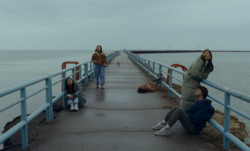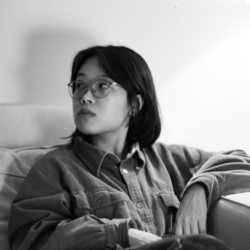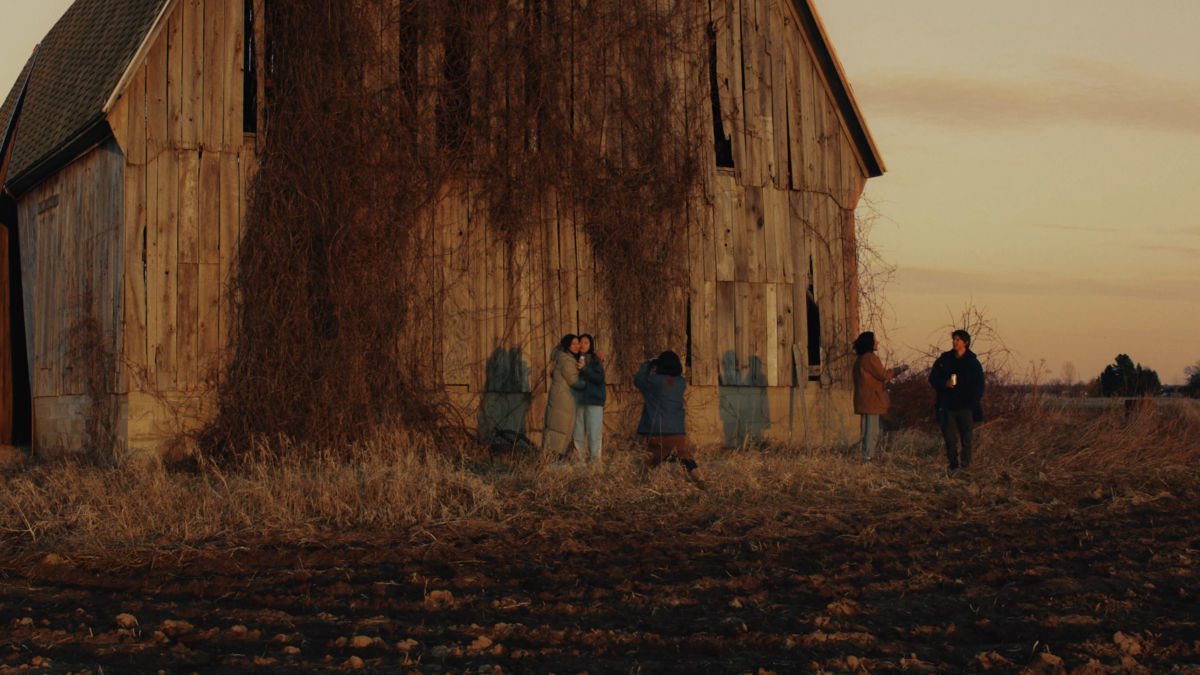A remarkable debut by a new young filmmaker
“I have no idea what I’m doing with my career,” Linh Tran candidly stated via phone interview. That uncertainty is confidently felt throughout her debut feature, “Waiting for the Light to Change.” Tran’s film, winner of the Grand Jury Prize at the 2023 Slamdance Film Festival, follows five twenty-somethings (Jin Park, Erik Barrientos, Joyce Ha, Quin Chi, and Sam Straley) who reunite on a weeklong getaway to a lakehouse in Michigan in the dead of winter. What seem like repressed desires and resentments fester as the week goes on, ending with an explosion of feelings. The story is an exploration of the messiness of these friends’ quarter-life crises, told through quiet snapshots of their time together.
The film is contemplative, much of it playing out in long unbroken shots that force the audience to linger around the characters, sometimes past the point of comfortability. Tran says her style of filmmaking is like watching animals at the zoo: “You come in and you gotta choose a spot to stand there and watch the animal, and it has to be the best spot. Anywhere else is not better than the spot that you choose. There’s a distance between you and the animal. The scene has its own dynamic. The animal might move or might do something that might make you feel like ‘I have to move to another spot in order to see this better.’ That’s when you cut to another set up. I only change shots when I really need to. I think cutting is a little bit of a cheat. I’m a slow person and I like to be in one place and not move at all, so it translates into how I make movies.”

(Image Credit: Linh Tran/Waiting for the Light To Change)
Tran’s deep well of film knowledge stems from her time studying at both DePauw and DePaul Universities. In “Waiting,” one can see the touches of everything from the messy humanism of Lee Chang-dong to the poetic minimalism of Éric Rohmer. “I like making movies,” she confesses, “but I think I like watching movies more.” She films in the 1.66:1 ratio, a rare format more commonly associated with European arthouse cinema. “When I’m influenced by a filmmaker,” says Tran, “ it’s okay for me to make it known. It’s all about sharing the things that we watch and the things that we find inspiring. More people benefit from that.”
Tran emigrated from Vietnam for school and has remained in the United States for the last ten years. According to Tran, the Vietnamese film scene is very much in its infancy, a factor that she relishes. “It’s very freeing to be a Vietnamese director,” she says. “All these Asian countries have these epic, super deep cinematic traditions. Vietnam doesn’t have that because we were too busy being colonized for a thousand plus years…That, to me, is freedom. You can do whatever you want. Nobody’s judging you. There’s no expectation of what you can do or what you should do. So I just do whatever I want, or whatever I can afford to do, in my own way.”
While “Waiting” features an almost entirely Asian cast, Tran’s film avoids the typical pitfalls of representation politics. Race is never discussed in the film. Instead, the characters exist in their Asianness as their humanity. “I only know what I know, so to me, representation is more about telling a story about a character that happens to be Asian, because that’s more truthful to me,” she says. “I only know the experience of being Asian, but I’m not trying to speak for a whole group of people. What right do I have to do that? That’s why I made ‘Waiting’ the way that it is. If you put an Asian person in a movie and then have an Asian actor to play them, it’s gonna come out. There’s so many things that’s Asian about us that goes beyond the surface level talk. Every gesture, all these things going on in your subconscious, all that might or might not be a result of you having an upbringing as an Asian person.”

(Image Credit: Jewells Santos)
Tran remains humble yet ambitious in an industry dominated by egoism and capitalism. She refers to a quote by poet Ocean Vuong about how making art is “building a raft on the shore, and then you kind of set the raft down river, and however the world engages with that little raft is up to the world’s agency… [you] have no say in it, And in fact [you] have to be on the shore to make anything else. [You] can’t stay on that raft because [you] would have to dismantle it to make anything else.” Her mind already is on future rafts. She recently signed with Rain Management Group. Her follow-up short, “Video Funeral,” was just awarded Best Short at the Ouray International Film Festival. In a time of such instability in the entertainment industry, one thing that remains certain is that Linh Tran has an exciting career in front of her.
“Waiting for the Light to Change” screened at the 46th annual Asian American International Film Festival.

